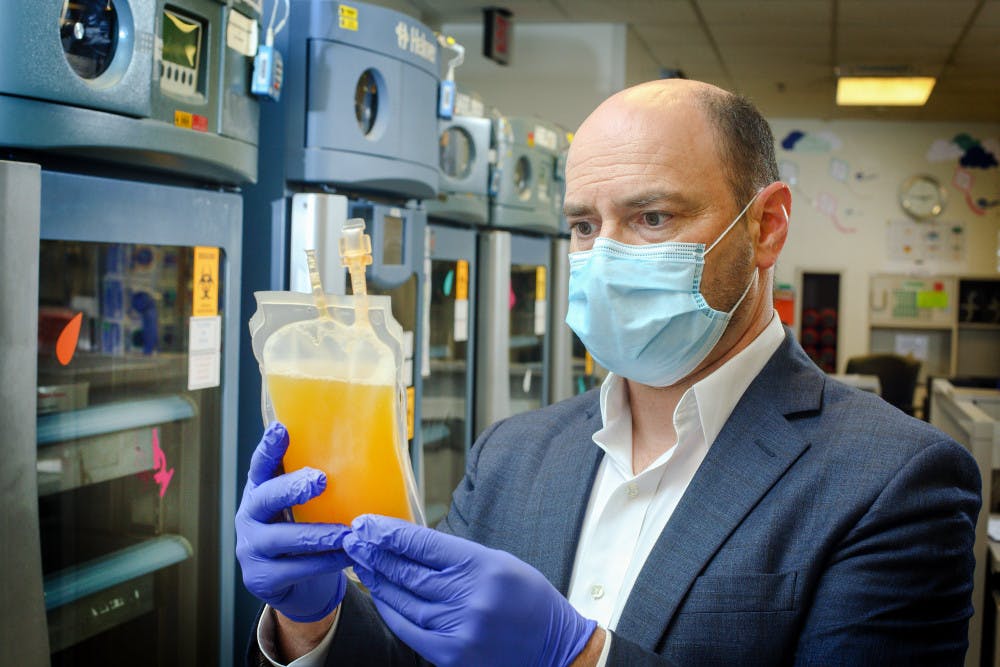Rhode Island Hospital has teamed up with researchers at Johns Hopkins University to test the effectiveness of convalescent plasma therapy as a potential early treatment for COVID-19. These multicenter clinical trials have commenced in Rhode Island to investigate whether this therapy could help reduce symptoms and infection among people recently diagnosed or at high risk of disease exposure.
Like vaccines, convalescent plasma therapy utilizes the immune system’s natural defense molecules — antibodies — to combat the virus. While vaccines stimulate the body’s immune system to produce antibodies over time, leading to long-term protection, plasma therapy injects antibodies that take action immediately.
Convalescent plasma therapy has been used to combat infectious diseases since the influenza outbreak of 1918. This year, the treatment has proven successful among severely ill, hospitalized COVID-19 patients. But researchers believe its greatest potential lies in early treatment and prevention of the disease.
“We think that the convalescent plasma can be rapidly validated and shown to keep people out of the hospital,” said David Sullivan, professor of molecular microbiology and immunology at the Johns Hopkins Bloomberg School of Public Health. Sullivan has played an integral role in developing the clinical trials. “There's no outpatient treatment right now for COVID-19, and this can fill our role as early treatment.”
To determine whether the treatment has this intended impact, the team is conducting a double-blind, randomized study taking place in more than 30 different locations across the country and is the first clinical trial of its kind for convalescent plasma, according to The Providence Journal. In this type of study, the patients are categorized into two cohorts: one receiving the treatment and another receiving an inactive substitute. Participants are not informed of which group they belong to. Clinicians administering the treatment are also unaware of which form of the treatment they are providing. This technique thereby minimizes bias in the experiment.
The researchers are running two different randomized trials: one for patients recently diagnosed with the disease and another for those at high risk.
“In the first week of illness, most people have very mild symptoms, so they aren't going to be feeling very, very sick, and usually don't need to be hospitalized,” said Associate Professor of Emergency Medicine Adam Levine, who is leading the trials in Rhode Island. The goal is to administer a treatment during this dormant period in the form of protective antibody molecules from prior COVID-19 patients that have recovered. If successful, this therapy would impede the progression of the illness, reducing the likelihood that a patient will need to be hospitalized.
The second trial, targeting people at high risk for COVID-19 — such as those living with a recently diagnosed roommate or family member — aims to “prevent (these high-risk people) from getting infected in the first place,” Levine explained. “For people like an elderly parent or grandparent who lives in the household, being able to prevent them from getting infected with COVID could significantly reduce their likelihood of dying.”
Michael Joyner, an anesthesiologist at Mayo Clinic who is not involved in these trials but was a lead investigator in a separate study showing that convalescent plasma treatment decreases mortality rates in inpatient COVID-19 patients, is “optimistic that both trials will give us insight into what to do next,” he said.
By focusing on people who are in the early stages of illness, the researchers in this clinical trial “are going upstream in the disease process, where, historically, antibody therapy has worked the best,” he added.
If the trials support the efficacy of convalescent plasma treatment, this therapy could be readily available in any place with recovered COVID-19 patients, whereas vaccines, for example, could be time-consuming and expensive to produce and distribute. This advantage makes convalescent plasma a “game changer,” Levine said.
“Even low-income countries and middle-income countries already have the infrastructure now to have people donate plasma,” Levine said. “In terms of what's actually available to the rest of the world that’s suffering from this pandemic, plasma is going to be the number one treatment.”
Sullivan and Levine stressed the importance of public involvement and strongly encouraged anyone exposed or diagnosed with COVID-19 to participate in the clinical trials. “The more people who volunteer for the study, the faster we can reach the sample size that we need to prove that this treatment is effective,” Levine said. “We are really trying our best to reach all communities that are exposed to this virus and try to enroll as many people as possible.”
Rhode Island Hospital has enrolled 12 participants so far, but is looking for more. In addition to reaching out to hospital patients and university medical directors, RIH is doing a special outreach to communities of color in Providence and has modified the study to welcome participation from non-English speakers.
People interested in registering in the clinical trials can sign up through the clinical trials’ website.
“We need people to be a part of the solution,” Sullivan said. “I firmly believe that proving we have therapy in the outpatient space will enable teachers to feel safe going back and teaching (and) allow people to feel safe going about their normal activities … I see it as necessary to show that it works so that we can get COVID behind us.”

ADVERTISEMENT




